|
|
|
Sort Order |
|
|
|
Items / Page
|
|
|
|
|
|
|
| Srl | Item |
| 1 |
ID:
165074
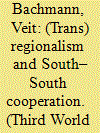

|
|
|
|
|
| Summary/Abstract |
The paper engages critically with the increasing importance of South–South cooperation and the shift from African–European to African–Asian interaction. It argues that South–South cooperation is too often framed in a spatial logics of regional integration and transregional cooperation and thus reproduces spatial understandings that are characteristic for African–European relations but misplaced in the context of African–Asian relations. Moreover, it analyses perceptions about the difference of European and Asian cooperation partners amongst political and societal elites in Kenya and Tanzania, arguing that instead of a shift from African–European to Afrasian spaces of interaction, the two mutually coexist and fulfil complementary functions.
|
|
|
|
|
|
|
|
|
|
|
|
|
|
|
|
| 2 |
ID:
165080
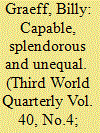

|
|
|
|
|
| Summary/Abstract |
This article examines how Brazil was perceived internationally during the 2014 World Cup (2014WC), for which one of Brazil’s perceived objectives was to enhance its international image to play a more significant role on the world stage. Nine media outlets’ coverage of the 2014WC was analysed using the website Alexa. These outlets published 699 articles about diverse themes relating to Brazilian society. The outlets studied considered the event a success overall and emphasised Brazil’s natural beauty, but raised concerns about social problems such as inequality. We conclude that the 2014WC updated but did not fundamentally alter Brazil’s international image.
|
|
|
|
|
|
|
|
|
|
|
|
|
|
|
|
| 3 |
ID:
165081
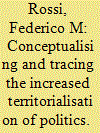

|
|
|
|
|
| Summary/Abstract |
The territorialisation of politics is a crucial transformation in state–society relations that has implications on how contemporary politics works. Defined here as the dispute for the physical control of space, be it a municipality, province or portion of land, within one or more politically constituted entities. It does not mean the emergence of a new regime type, but the process through which the territory re-emerges as a new cleavage after neoliberal reforms and authoritarian regimes have weakened/dissolved neo-corporatist arrangements for the resolution of socio-political conflicts in society. It is a cleavage because central political divisions are produced as a result of the physical encounter of or distance between political actors and of the dispute for the control of a territory for sociopolitical goals and causes that are not always territorially defined. Departing from this definition, I also raise potential explanatory hypotheses for the transformations that favoured this transformation in Argentina.
|
|
|
|
|
|
|
|
|
|
|
|
|
|
|
|
| 4 |
ID:
165076
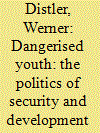

|
|
|
|
|
| Summary/Abstract |
International organisations, the national government and civil society alike have identified youth as a potential threat to the stability of the young state of Timor-Leste over the last decade. In this article, I ask how these actors define the danger of youth and what reasons they identify for the potential threat of young citizens for the society and state. Guided by a theoretical framework of Critical Security and Development Studies, I argue that while political manipulation as reason for youth violence was a prominent part of the security discourse in the years after the crisis in 2006, the discourse on the danger of youth in very recent international and national documents has been depoliticised. Despite decreasing numbers of youth-related violence, the threat construction has not vanished; rather, the language on youth has been adapted to the existing international discourse on violent youth as a threat to successful development. In this way, international and national actors have sustained the image of a society in need of management.
|
|
|
|
|
|
|
|
|
|
|
|
|
|
|
|
| 5 |
ID:
165078
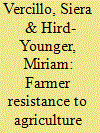

|
|
|
|
|
| Summary/Abstract |
Drawing on postcolonial literature and theories of farmer resistance, this article provides an empirically based alternative explanation of African farmer behaviours to narratives that blame them for their lack of technology adoption. Based on six months of ethnographic immersion in one district in the Northern Region of Ghanaa, we identify the ways that farmers defy commercial agriculture investment, government services and non-governmental organisation (NGO) project interventions aimed at intensification, and describe their reasons for doing so. This study interprets farmers’ acts of defiance, such as side-selling or falsely weighting their products, as insights into everyday acts of resistance. We find that throughout Ghana’s postcolonial period, agriculture intensification policy and practice have produced an environment where various development actors and farmers have both a sense of entitlement and mistrust of each other. Farmers’ acts of sabotage may be spaces where they make rational choices based on experiences of historical antecedence, including decades of failed development projects, elite corruption and mismanagement, degrading ecologies and donor hegemony.
|
|
|
|
|
|
|
|
|
|
|
|
|
|
|
|
| 6 |
ID:
165077
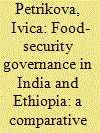

|
|
|
|
|
| Summary/Abstract |
Despite recently legislating the right of all citizens to food security, India continues to suffer high food-insecurity rates. With respect to several measures, food insecurity in India appears to be actually higher than in Ethiopia, a country with only one-fourth of India’s average per-capita income. This article examines comparatively the two countries’ food-security challenges and governance mechanisms and identifies several relevant policy areas for mutual learning – dietary diversity, maternal and infant nutrition, and sanitation as well as food production and programmes’ external oversight. Beyond India and Ethiopia, these findings are pertinent also to other developing countries facing similar food-security challenges, such as Pakistan, Nigeria or Sudan.
|
|
|
|
|
|
|
|
|
|
|
|
|
|
|
|
| 7 |
ID:
165071
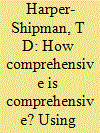

|
|
|
|
|
| Summary/Abstract |
This paper asks how comprehensive and holistic is the World Bank’s current development model, also known as the Comprehensive Development Framework (CDF), in Africa? By comprehensive and holistic, I am referring to whether the framework has the ability to capture the sources of all impediments to progress in different African contexts and offer corresponding solutions. I argue that the CDF is myopic and hackneyed. Not only does the World Bank employ the same neoliberal logic that informed structural adjustments, but it also continues to miss crucial non-material facets of development in the African countries it purports to serve. I make this argument by comparing the CDF/Poverty Reduction Strategy Papers (PRSP) model in Kenya to the under-utilised development philosophy of Wangari Maathai. This comparison intimates that an alternative to the CDF is not only possible, but also necessary. Maathai demonstrates how any holistic development approach for postcolonial Africa must grapple with both international and domestic factors that historically and currently exacerbate the chrysalis of political, economic, and social progress. A comprehensive approach must also deal with the particulars of each context while not eliding the uniform histories of exploitation and purposive underdevelopment that many African countries share.
|
|
|
|
|
|
|
|
|
|
|
|
|
|
|
|
| 8 |
ID:
165072
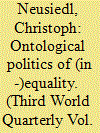

|
|
|
|
|
| Summary/Abstract |
This article aims to add a new line of research to the post-development school of thought. Drawing on the many evident yet rarely noticed parallels between post-development and (post-)anarchism, I develop an understanding of ‘anarchistic post-development’ as a politics based on what French philosopher Jacques Rancière calls ‘the presupposition of equality’. I further connect this with Arturo Escobar and Marisol De la Cadena’s concept of political ontology, suggesting that we can make sense of and analyse both contemporary ‘Development’ projects as well as anarchistic post-developmental ‘alternatives to Development’ through the lens of what I call ‘the ontological politics of (in-)equality’. To substantiate my points, I will draw on the recent case of a Mâori tribe who won a historical legal battle to declare the Whanganui River a living entity.
|
|
|
|
|
|
|
|
|
|
|
|
|
|
|
|
| 9 |
ID:
165073
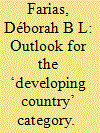

|
|
|
|
|
| Summary/Abstract |
In the 2016 edition of its World Development Indicators (WDI), the World Bank introduced an important change in the way it categorises countries: it explicitly stated the intention to eliminate the distinction of countries as ‘developing’ and ‘developed’. This decision represents the first time one of the world’s most powerful and influential international organisation has overtly decided to move away from this fuzzy-yet-ubiquitous terminology for categorising countries (and not proposing to replace the division). This paper takes this shift to discuss country groupings based on development levels, particularly the ‘developed’/’developing’ dichotomy, focusing on the latter term. The paper argues for a paradoxical scenario, wherein the label ‘developing’ will increasingly become analytically useless while concurrently retaining – or even strengthening – its power in the context of foreign policy strategies. The analysis details the motives behind this paradox and provides a reasoning for when and why the term’s usage is likely to be weakened or strengthened. Simply put, the ‘developed’/’developing’ dichotomy is weakening in its analytical capacity, mostly due to the increasing heterogeneity among countries under the ‘developing’ label and concurrent porosity of ‘boundaries’ between the two categories, while showing little sign of being phased as a term for self-identification.
|
|
|
|
|
|
|
|
|
|
|
|
|
|
|
|
| 10 |
ID:
165075
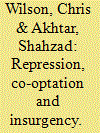

|
|
|
|
|
| Summary/Abstract |
Scholars have long identified state repression as playing a key role in the onset of insurgency. Violence by security forces increases anger against the state and assists with rebel recruitment. Yet scholars have also recognised that repression does not always lead to rebellion: in some cases it successfully quashes movements before they have begun. This study advances an argument for when and why repression leads to insurgency and sometimes does not. We contend that violence by state security forces can fail to trigger rebellion if local elites within the repressed community are simultaneously co-opted with political and economic opportunities. When elites are satisfied with local autonomy and patronage they deprive the dissident movement of local leadership and coordination. When the state uses repression against a community and at the same time abandons this mutually beneficial relationship, the insurgency has both the leadership and grassroots support it requires. We illustrate our argument by examining three cases of state violence in Asia. In two of our cases, Pakistan’s Federally Administered Tribal Areas (FATA) and Southern Thailand, repression led directly to insurgency. In the third, Papua in Indonesia, ongoing co-optation of local elites has left the movement factionalised and weak.
|
|
|
|
|
|
|
|
|
|
|
|
|
|
|
|
| 11 |
ID:
165079
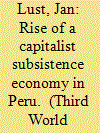

|
|
|
|
|
| Summary/Abstract |
The Peruvian economy depends for its growth on the export of its mineral resources. This dependency is derived from the country’s role in the international division of labour and is expressed in its export structure, economic structure and business structure. Peru’s dependency on its mineral resources, an economic structure that is principally made up of non-tradable sectors and a business structure dominated by micro businesses, make lasting economic progress very difficult. We argue that although the Peruvian economy is divided into an advanced economy and a capitalist subsistence economy, the country is not a dual economy where two sub-economies are economically and socially separated from each other and have structurally different modes of operation. The capitalist subsistence economy is characterized by low productivity levels and is expressed in remuneration rates at or near the minimum wage level. This structural feature of the Peruvian economy impedes the successful implementation of a process that would make the country less dependent on its natural resources and would set it on a development course of increased value-added production.
|
|
|
|
|
|
|
|
|
|
|
|
|
|
|
|
|
|
|
|
|